Hamstring muscle stretching exercise
Table of Contents
What is hamstring (hams) stretch?
- Hamstring stretch exercise is a great way to increase the flexibility of the leg mainly on the back side of the thigh & it has many health benefits as well as decreases the risk of injury mainly in the Back, knee, and Hip region as well.
- A hamstring muscle is a group of three muscles that cover the back of the thigh. These muscles are the semimembranosus, semitendinosus, and biceps femoris, which cover hip & knee joints. Sports that include sprinting or even stop-and-start motion, such as soccer and tennis, can create tightness in the hamstrings. So many tasks like dancing and running.
- Keeping these muscles loose is effective. Tight hamstrings are responsible for the strain or tearing. There is also a difference between injury as well as tightness. If the patient feels pain in the hamstring, it is good to see a doctor before trying to treat the injury at home.
- There are so many stretches that you can perform to assist keep the hamstrings loose. It is the best idea to warm up the muscles before stretching. Try to walk or perform some other activity to warm muscles.
- You should perform stretch the muscles at regular intervals, including the hamstrings, regularly. Even a few minutes of daily stretching may increase your overall mobility.
- If someone feels lasting tightness in the hamstrings, they should consider speaking to their physiotherapist. Persistent tightness in the hamstrings can indicate that the muscles are over-lengthened.
What are the health benefits of hamstring stretches?
Hamstring stretches may maintain the hamstring’s loose as well as flexibility. Flexible hamstrings have many advantages, including:
- Avoiding lower back pain: Tight hamstrings lower the mobility of the pelvis, which may give pressure to the lower back. Strengthening as well as stretching the hamstrings may avoid them from becoming too tight & give extra support to the back and pelvis as well.
- Reducing injuries: Maintaining the hamstrings loose will decrease the chance of straining or even tearing the muscle fibers while strenuous physical activities, namely jogging, and running.
- Increasing flexibility: Hamstring stretches may improve flexibility as well as increase the range of motion in the hip. Both of these advantages will assist people to perform daily activities, namely bending over, with ease & walking upstairs.
- Improving posture: When the hamstrings are tight, the muscles rotate the pelvis backward. It can destroy the natural arch in the back, which may cause wrong seated as well as a standing posture. Maintaining the hamstrings loose may help people stand taller as well as sit straighter.
- This increases the mobility of the hip as well as knee joints. Namely, increase ROM of knee flexion as well as hip extension.
- This maintains optimal athletic performance.
- Stretching the hams after an athletic performance may help decrease delayed-onset muscle soreness (DOMS) in these muscles.
What are the different types of hamstring stretch?
There are so many types of stretching techniques for a hamstring. Those are :
- The Simple Hamstring Stretch
- The Hurdler Hamstring Stretch
- Standing Hamstring Stretch (Both Legs at Once)
- Standing Hamstring Stretch (One Leg at a Time)
- The Towel Hamstring Stretch
- Wall hamstring stretch
- Seated hamstring stretch
- Hamstring stretch on the edge of a bed
- Advanced seated hamstring stretch
- Toe Touching
- One-legged Standing Hamstring Stretch
- Easy Hamstring Stretch for Athletes
- Advanced Hamstring Stretch for Athletes
- Partner Hamstring Stretching
- Foam roll hamstrings
- Standing hamstring stretch 2
- Seated hamstring stretch (with squats)
- Rotating toe touch
- Seated wide-leg hamstring stretch
- Staggered Hamstring Stretch
- Standing hamstring scoop
- Inchworm hamstring stretch
- Toy soldier hamstring stretch
- Yoga poses.
The Simple Hamstring Stretch
- How to stretch hams: Sit on a mat with both legs out straight.
- Extend both arms & reach forward by flexing at the waist as far as possible during keeping the knees extended.
- Hold the simple position for 15 – 30 seconds.
- Relax back into the starting position.
- Repeat 3-4 times.
- Be sure to stretch until a mild pull is felt in the back of the thighs. If the patient feels any extra pain, he should stop the exercise.

The Hurdler Hamstring Stretch
- A hurdler hamstring stretch is a simple exercise that may be performed right on the floor.
- How to stretch hams: Sit on the floor with the right leg out straight.
- Bend the left leg at the knee & position the sole of that foot against the right inner thigh.
- Extend both arms & reach forward over the right straight leg by bending at the waist as far as possible.s
- Hold the bending position for 10-15 seconds.
- Relax & repeat with the left leg.
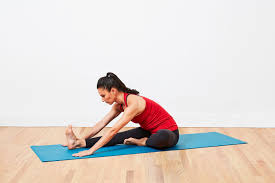
Standing Hamstring Stretch (Both Legs at Once)
- How to stretch hams: Stand as well as cross the left foot in front of the right.
- Gently lower the forehead to the left knee by flexing at the waist.
- Keep both knees extended.
- Hold the bending position for 15 – 30 seconds.
- Relax & repeat for the other side by crossing the right foot in front of the left.
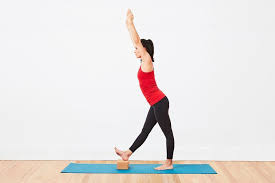
Standing Hamstring Stretch (One Leg at a Time)
- How to stretch the hamstring: Stand tall with one heel resting on a stool.
- Keep a knee extended.
- Reach up into the air so the arms are about parallel with the ears.
- Reaching the arms upward, as opposed to reaching lower toward the foot, will maintain a back straight.
- Keep the back straight. A patient may be flexing forward slightly from the hips.
- Reach forward as well as experience the stretch in the hamstring behind the thigh.
- Hold these hams stretch for 15 – 30 seconds, as well as repeat 3-4 times.
- Switch the legs and repeat with the opposite leg.
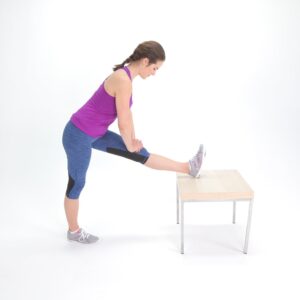
The Towel Hamstring Stretch
- How to stretch hamstring: Lie on a mat on the back.
- Twist the long bath towel around the toes and grab the ends of the towel in both hands.
- Slowly pull on a towel to raise the straight leg. Be sure to keep a knee extended. The leg without a towel should remain flat on the mat.
- Take a leg upward until the stretch is felt behind a thigh. A person may also feel the stretch in her calf. That is normal.
- Hold the towel stretch for 15 – 30 seconds, and then relax.
- Repeat 4-5 times on each leg.

Wall hamstring stretch
- A stretch is done at the corner of a wall or near the couch.
- How to stretch the hamstring: Keep the left leg on the ground, and place the right leg against a wall or arm of the couch.
- Slowly push a knee so that the lifted leg is as straight as tolerable.
- Hold the hamstring stretch initially for 10 seconds, and gradually hold up to 30 seconds.
- Do a stretch with each leg, one at a time, 3 to 5 times for one complete set. Aim to do 2 sets daily.

Seated hamstring stretch
- How to stretch hams: Sit on the border of a chair, straighten the right leg in front of the body with the heel on the ground.
- Extend a spine by sitting tall and moving a pelvis forward.
- Hold a seated stretch for 30 seconds.
- Repeat 2- 3 times for each leg. Aim to do the exercise twice daily.
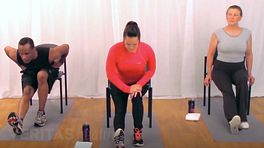
Hamstring stretch on an edge of the bed
- How to stretch hams: Sit on the border of a bed.
- Place the right leg along the border of a bed during the left leg is placed down with the foot resting on the ground.
- Flex forward at a hip, keeping a spine straight.
- Try to maintain a leg on the bed as straight as possible without pain.
- Hold these hamstring stretch for 30 seconds.
- Repeat 2-3 times for each leg. Aim to do the exercise twice daily.
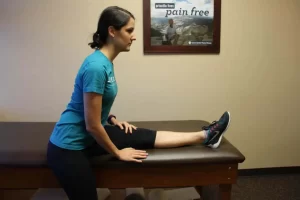
Advanced seated hamstring stretch
- For a stretch, a patient needs two chairs.
- How to stretch the hamstring: Take the straight sitting position on a chair with the shoulders moved back and the spine in the normal position.
- Lift right foot onto a seat of the other chair and extend the leg.
- A stretch will be felt in the back of the thigh and the leg’s calf muscles.
- Inhale to straighten the spine. While exhaling, flex a trunk forward over the extended leg. If the position causes any pain in the leg and/or back, stop immediately.
- Hold a seated stretch for 5 – 15 seconds.
- Repeat with the left leg. Aim to do the exercise twice daily.
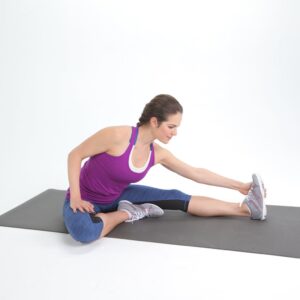
Toe Touching
- How to stretch the hamstring: Take the standing position with the arms by the sides.
- Now raise both arms & bend the waist level.
- Try to touch the toe with the fingers respectively (right fingers to right toe).
- Bend as much as you can, try to reach the foot & remember to straighten the knees throughout a stretch.
- When the patient feels the stretch, hold this toe-touching stretch for around 10-15 seconds.
- Do this 3-4 times.
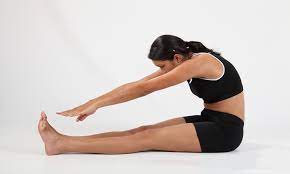
One-legged Standing Hamstring Stretch
- How to stretch the hamstring: Stand straight with the arms hanging on the sides.
- Now bend one leg at the knee & grab that knee with both hands. Next, pull a knee towards the chest as much as you can.
- The other leg is slightly bent at the knee.
- The patient can use the wall for support. Hold the standing position for 5-10 seconds & release.
- Do this 8-10 times on each leg.
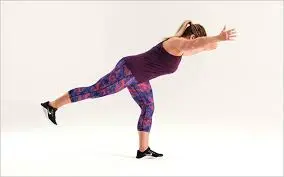
Easy Hamstring Stretch for Athletes
- How to stretch the hamstring: Stand in front of the table that is at the waist or the little lower level.
- Now put the right leg heel in front of a table.
- Now bend forward at the hip level with our arching the spine.
- Be sure that the right knee is extended while the stretch.
- The left knee can be slightly bent.
- When the patient feels stretched during the leaning, stop there for 10-15 seconds & release.
- Perform this on the left side.
- 3-4 times in each leg.

Advanced Hamstring Stretch for Athletes
- How to stretch hamstring: Stand in front of the bench at waist level.
- Place the left leg on the bench & keep your spine straight.
- Now do one leg squat on the right leg.
- This gives you a deep stretch into the left hams.
- Be sure to straighten the spine while stretching.
- Hold the squat for 5-10 seconds & return to the starting position.
- Do this 8-10 times on each leg.

Partner Hamstring Stretching
- How to stretch hamstring: Take a supine position on the mat.
- Both legs are extended in front of you.
- Now the partner lifts the leg straight towards the head without bending a knee.
- The patient feels the stretch backside of the thigh, hold that for 15-30 seconds.
- Repeat on the other leg. Do this exercise 3-4 times on each leg.
- To feel a deeper stretch, the partner bends the foot downward/dorsiflexion. The patient can feel a stretch in the calf muscle also.
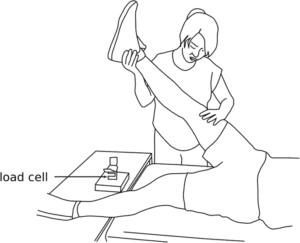
Foam roll hamstrings
- How to stretch the hamstring: Sit on the floor with the foam roller under the left thigh. The right leg may stay on the floor for support.
- The arms are behind you, roll the hamstring, the complete back of the thigh, from the end of the buttocks to the knee.
- Maintain the core engaged & the back straight.
- Continue gently rolling for 30 seconds to 2 minutes total.
- Repeat with an opposite leg. Try to roll out the hamstrings thrice a week.

Standing hamstring stretch 2
- How to stretch hamstring muscle: Stand tall with the spine in the neutral position.
- Place the left leg in front of the body with the foot flexed, a heel pushed into the ground, & the toe pointing toward the ceiling.
- Slightly bend a right knee.
- Slowly lean forward & place the hands on the straight left leg.
- Maintain the neutral spine.
- Hold these hamstring stretch for 10–30 seconds.
- Repeat 2-4 times.
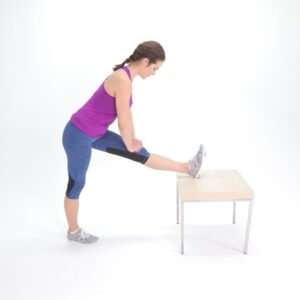
Seated hamstring stretch (with squats)
- Check the balance with a seated hamstring stretch with squats.
- How to stretch the hamstring: Bend the left leg & squat on the ground in such a way that the backside is touching the heel of the left foot.
- Extend the right leg straight in front of you.
- Bend forward to reach the right toe during keeping the back straight.
- Hold the squat position for 10 to 15 seconds.
- Repeat the steps with the left leg.
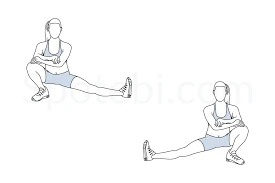
Rotating toe touch
- How to stretch the hamstring: Stand straight with the feet wider than hip-width apart with the arms extended out to the sides at shoulder height.
- Keeping the legs extended as well as the arms aligned, twist the upper body & extend the left arm down toward the right ankle.
- The patient can feel the stretch more sharply in the back of the right leg.
- Hold this rotating stretch for 15 to 30 seconds. Return to the starting position & repeat on the other side.

Seated wide-leg hamstring stretch
- How to stretch hamstring muscle: Sit down with the legs straight out wide in opposite directions.
- Maintaining the spine long, fold forward.
- Extend both arms forward till you feel a stretch in the back of the legs.
- Make sure both legs remain completely on the floor.
- With each exhale, try to drag the hands out a little further to deepen the stretch.
- Hold for 20 – 30 seconds. Return to the starting position & repeat.
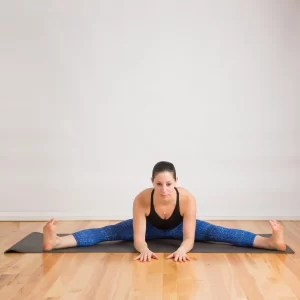
Staggered Hamstring Stretch
- How to stretch hamstring muscle: Start standing in the staggered stance with the left foot slightly in front of the right.
- Bend the right knee slightly, keeping the left leg straight.
- Maintaining the flat back, push the hips back to feel the stretch in the left hamstring.
- Continue moving the hips back to deepen the stretch.
- Hold these hamstring stretch for 20 – 30 seconds, then switch sides.
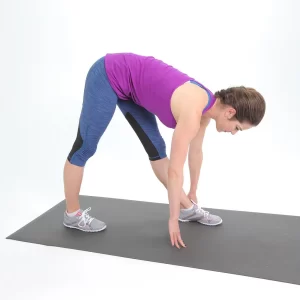
Standing hamstring scoop
- How to stretch hamstring muscle: Stand with the feet around hip-width apart facing forwards as well as inhaling.
- Shift the weight into the right foot & extend the left leg slightly in front of you with the heel flexed & toes pointing towards the roof.
- As you exhale, bring both arms down towards the left foot, hinging slightly at the hips & bending the right knee.
- Scoop the arms lower & return towards you.
- Repeat 10-12 times then switch to the right leg.
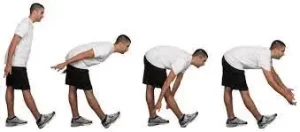
Inchworm hamstring stretch
- How to stretch hamstring muscle: Stand tall with the feet around hip distance apart facing forwards & inhaling.
- As you exhale, extend the hands down towards the feet as well as roll down one vertebra at a time, hinging at the hips.
- The patient can slightly bend the knees if the hamstrings are tight.
- When the hands reach the ground, inhale as well as move the hands forwards along the ground.
- When the hands reach directly below the shoulders, stop there in a plank position.
- Exhale & move the hands back towards the feet till you are in a forward fold position.
- While this move back is when the patient can feel the lower hamstring stretch.
- Inhale & gently roll back up until you are back at the starting position.
- Repeat 8-10 times.

Toy soldier hamstring stretch
- How to stretch hamstring muscle: Begin standing with the feet around hip distance apart as well as facing forwards.
- Moving from the hip, swing the right leg up in front of you with the feet flexed. Keep the left leg straight.
- Reach the left hand forwards to meet the right foot, trying to touch the toes.
- Back to the starting position & do this on the opposite side.
- Do 10 repetitions on each leg, inhaling as well as exhaling as you turn the legs.
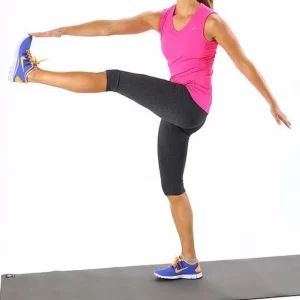
Downward Dog
- How to stretch hamstring muscle: Embark on the mat on the hands as well as knees.
- Then raise the knees & send the tailbone toward the ceiling.
- Extend the legs slowly. Tight hamstrings can do the pose difficult, so the patient can bend the knees slightly.
- Just assure to keep the straight spine.
- Hold the dog pose for 10-15 seconds & then release.
- Do it 3-4 times on each leg.
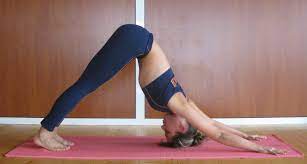
Extended Triangle Pose
- How to stretch hamstring muscle: Initiate in the standing position. Then move the legs around 3-4 feet apart.
- Reach the arms out parallel to the ground with the palms facing towards the ground.
- Turn the left foot in toward the right & the right foot out 90 degrees. Maintain the heels in line with one another.
- Slowly bend the torso over the right leg & reach the right hand to the ground or a yoga block for support.
- Stretch the left arm toward the roof.
- Hold for 30 – 60 seconds.
- Do this on the opposite side.
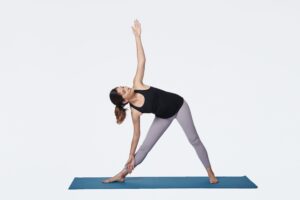
What are the common mistakes to Avoid while hamstring stretching?
There is a certain mistake that the patient should not do while stretching:
- Bending the knees: If the patient wants perfect hamstring stretch in sitting, try to keep the legs extended. If the hamstrings are tight, so you need to bend the knees, simply do not stretch forwards as much. Remember that increasing hamstring flexibility takes time.
- Hunching over the shoulders: Try to hinge at the hips level, rather than hunching over from the shoulders. Imagine reaching ‘up & over the legs as well as trying to keep the spine in the normal position. This is good to have a neutral spine & not move as far forwards as to hunch over just to touch the toes.
- Not flexing the toes of the working leg: The toes of the extended leg must be pointing upwards so that the leg stays straight.
- Not having the hips square: Keep the hips facing forwards & side by side with each other. It helps to maintain the pelvis correctly aligned as well as avoids unequal strain on the hips.
- Arching the lower back: Try to maintain the lower back as flat as possible to the ground & the pelvis neutral. It assures that you do not strain the lower back & do it a safe hamstring stretch. The patient may even put a towel or blanket under the lower back for extra support.
- Wrong alignment: Make sure that the hips are parallel directly over the feet, rather than pushing the bum out behind you. It assures that you are feeling the stretch in the hamstrings.
- Over-stretching: There are advanced hamstring stretches available, but be careful not to use the band too much that you cause injury.
Do not overstretch with the strap. - Moving too quickly: While dynamic hamstring stretch, the movement should still be relatively slow & controlled so that the patient may feel the stretch in the hamstrings. The fast movement does not give the muscle a benefit.
- Not engaging the core: Though it is a hamstring stretch, this is still important to work the core to protect the lower back from the strain.
What are the safety as well as precautions for hamstring muscle stretch?
- Here are a few tips to make the hams stretch safer & more effective:
- Do not bounce. Bouncing triggers a mechanism called a stretch reflex. It can cause more muscle contraction, not less.
- Lift the sitting bones toward the ceiling. This lengthens the hamstring muscles.
- Assure the hips are directly over the feet. The buttocks are not behind the feet. It error makes the stretch less effective.
- If your core muscles are weak, need to use the table or other surface to help you come back up to standing while the squat stretch.
- The rule of thumb for safety is only going as far as you can without feeling back pain or any insecurity.
- Do not stretch while you are in pain or try to force the stretch. Breathe normally while performing stretching exercises. Try to do hamstring stretches into the routine for at least 2-to 3 days every week.
FAQ
What are the symptoms of tight hamstrings?
Other signs that the patient has overly tight hamstrings include low back pain as well as stiffness, knee pain, & radiating pain in the buttocks and back of the leg (sciatica pain). The latter could be caused by a sciatica nerve being pinched but is often related to tight hamstrings as well.
What causes hamstrings to be so tight?
Causes of tight hamstrings include prolonged sitting, insufficient stretching before physical activity, muscle strain or even another injury, & having short hamstrings or other physical characteristics which make hamstring strain more likely.
How long does it take to loosen hamstrings?
The Hamstrings are not Tight
Normal muscle tightness gets better within 1-2 months of stretching. Heck, the patient does not even need to stretch to get more flexible if this were the case. The patient had only need to be doing a fuller range of motion to get rid of that tightness.Why will not my hamstrings loosen up?
The reason hamstrings feel tight is quite likely due to they are in fact overstretched. Owing to the patient sitting down much more than the human body likes to, we end up with tightness in the front of the thigh & in the lower back. The hamstrings & backside muscles end up in the lengthened position while you sit.
Should the patient stretch the hamstring if it hurts?
Returning to strenuous exercise too quickly could make the injury worse, but avoiding exercise for too long may cause the hamstring muscles to shrink as well as scar tissue to form around the tear. To avoid this, the patient should start doing gentle hamstring stretches after a few days, when the pain has started to subside.


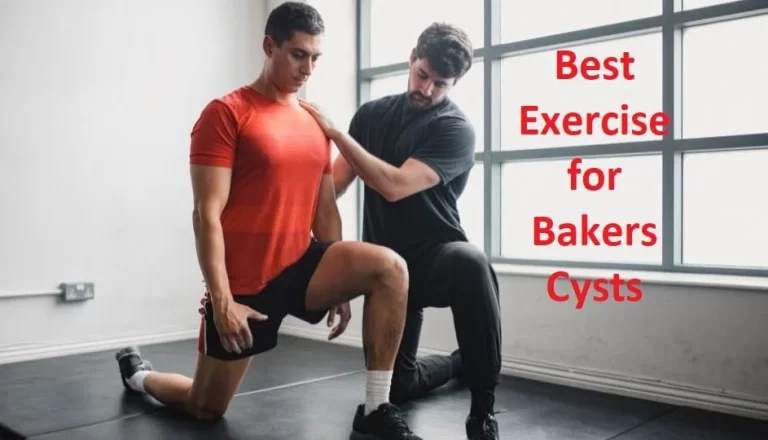
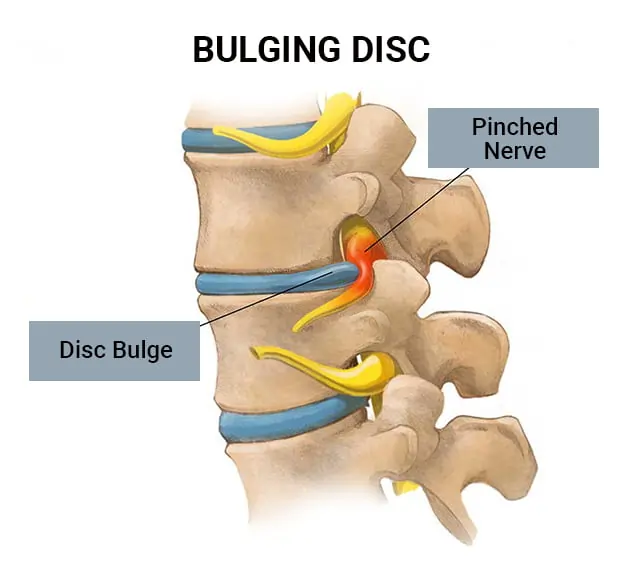
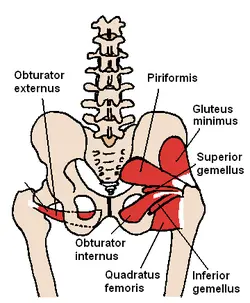


5 Comments